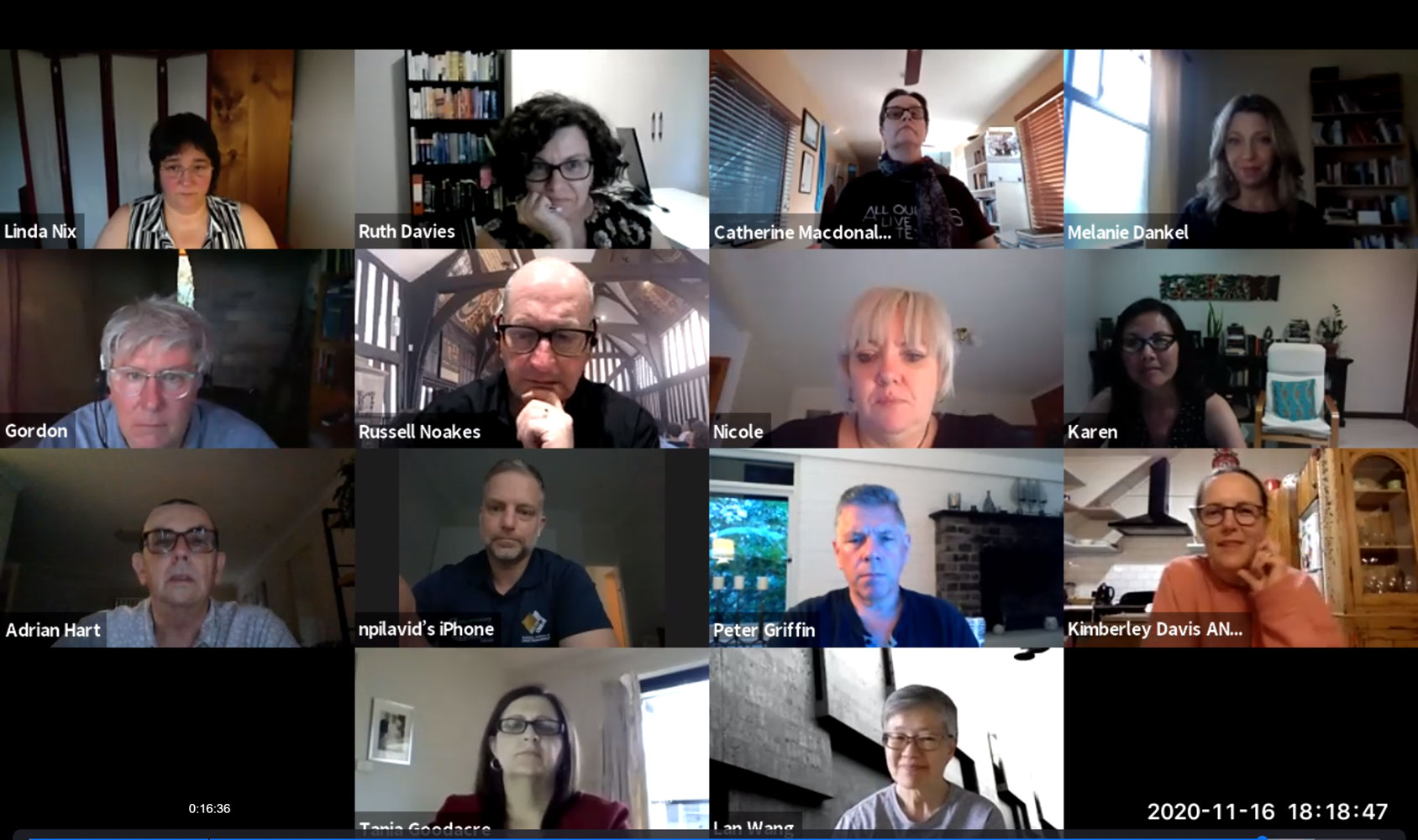Meet your IPEd Board
We’re pleased to introduce the IPEd Board, following the AGM in early November. This is the first time we’ve had the full complement of seven branch-appointed and three Board-appointed Directors, so it signals the next step in being able to focus on governance and strategy to benefit all members.

IPEd Board during a Zoom meeting
The image shows us all at our governance training on 16 November, by Zoom, of course. Left to right, top to bottom, we have:
Dr Linda Nix AE (Chair of Accreditation Board and non-voting attendee at Board meetings): Linda is an experienced editor and book designer with nearly 25 years of experience in the publishing industry across a range of fields, from law books to poetry. She regularly presents at industry events and runs workshops for both editors and writers. A NSW branch member since 2010, she has been on the IPEd Accreditation Board since 2017 and Chair since 2019; she is also an IPEd Ambassador and an executive board member of the New England Writers’ Centre. A philologist by training, she loves dead languages but loathes dead language, and hopes for a future where empty expressions like ‘moving forward’ apply only to actual motion.
Ruth Davies AE (Director Editors Queensland and Chair of the Board): Ruth has been a freelance editor for about 10 years and has been editing for more than 15. She’s been a member of IPEd since 2008 and started volunteering on the committee for the then Society of Editors in 2015. She’s looking forward to the year ahead and accordingly has decided that ‘respair’ is her new favourite word.
Dr Catherine Macdonald AE (Director Editors Western Australia): Catherine completed her doctorate on social change among woman-headed households in Tanzania in 1996. For more than 30 years, she has been consulting in the community development field, often editing/rewriting social impact assessment reports as the only native English speaker in an international research team. She has been on the Accreditation Board and involved with the EdWA branch since 2018. She is particularly keen on enhancing opportunities for remote and regional members to participate in IPEd activities.
Melanie Dankel (Director Editors South Australia): Melanie has been an editor for more than 20 years (and a Society of Editors/IPEd member for almost as long), working both in-house and as a freelancer, and currently works at the University of Adelaide on the journal JBI Evidence Synthesis. She has served as Training Officer and President for Editors Victoria as well as Professional Development/Events Officer and now President of EdSA. She’s looking forward to a notorious* year and hopes to see some Editors SA members in person next year.
*see President’s report in the EdSA Branch news.
Gordon Campbell AE (Director Editors Tasmania): Gordon focuses on academic and educational editing. He has been a copyeditor for the Journal of Bioethical Inquiry since 2015 and has edited manuscripts for a range of other journals. He’s also had extensive experience writing and editing content for vocational education. Gordon’s editorial experience thus encompasses both plumbing and philosophy, which are, of course, very similar disciplines. To keep society functioning (and to paraphrase John W Gardner) both our pipes and our ideas need to hold water. Gordon’s editorial pet peeve is peevery and/or peevishness based on nonsense rules of grammar. According to Gordon, ‘10 items or less’ is excellent English, prepositions at the end of sentences are perfectly cromulent, and editors need to — diligently, ruthlessly and relentlessly — eradicate the myth that infinitives should not be split.
Russell Noakes (Director Editors New South Wales and IPEd Company Secretary): Russell has more than 45 years’ experience in the government and finance sectors as an editor and policy professional. He has corporate governance experience, having worked as Secretary and Corporate Strategy and Legislation Adviser to the NSW Level Crossing Strategy Council and Secretary and Corporate Strategy Adviser to the NSW lndependent Transport Safety Advisory Board. He is also the EdNSW Vice-President and Budget Officer. He is passionate about tai chi and qi gong, which he practises on most days. His favourite quote, from Shakespeare’s The Merry Wives of Windsor, was decided early in his time as a public servant: ‘… here will be an old abusing of God’s patience and the king’s English’. Russell is focused on seeing IPEd continue to grow as an organisation that supports its members and works toward our shared mission: to advance the profession of editing.
Nicole Mathers (Administration and Board Secretariat): Nicole joined IPEd as an associate member in 2011 and has been with IPEd in various administration roles since 2013, working in support roles for Editors Victoria before transition in 2016. She looks after membership as well as company secretary administration, knows all about MemNet and has editing qualifications as well. If there’s a question she can’t answer, we haven’t heard it yet. She is looking forward to getting out and about again when Victorians are welcomed interstate and into New Zealand.
Karen Lee (CEO of IPEd): Karen joined IPEd in 2016 as CEO, coming from a background of corporate law. She has worked as Senior Policy Adviser to the Australian Democrats and as Chief of Staff to two senators. She has strong strategic advocacy and campaigning skills and extensive experience working at executive and senior levels in both the community sector and state government. She says she has become a better writer since joining IPEd by absorbing everything there is to know about editors and editing. She’s working on honing all future manuscripts into Stradivariuses and, while we’re on musical analogies, making the IPEd strategic plan sing.
(Adrian Hart, from Associations Forum, who led us in governance training)
Nick Pilavidis (Finance Director): Nick is a CPA and a graduate of the Australian Institute of Company Directors who has been on the Board of the Australian Institute of Credit Management, the professional association for credit professionals, and has been its CEO since 2014. He joined IPEd as the Finance Director in May 2019 and as part of that role leads the Finance and Risk Management committee. He is confident that after overcoming the challenges of 2020 we will all be able to handle whatever 2021 has planned for us.
Peter Griffin (Membership Director): Peter is General Manager and Deputy CEO of the Real Estate Institute of NSW and has worked for the association for 13 years. He is a Certified Practising Marketer and a Chartered Accountant. For IPEd, he is working to support a thriving membership and is developing a strategy to attract and retain members. He hopes that next year is a ‘very good year’ (with a nod to that great song by Frank Sinatra).
Kimberley Davis (Director Editors Aotearoa New Zealand): Kimberley has almost a decade of experience as a professional editor and writer for both commercial and academic publishers in New Zealand, Australia and the UK. She was named Young NZ Publisher of the Year at the 2019 Book Trade Industry Awards. She runs a writing and editing business with her sister, Claire, and lives in Wānaka, a small town in Te Waipounamu, the South Island of New Zealand. Her favourite piece of punctuation is a well-used semicolon — or even, to quote Ursula K Le Guin, a ‘half-assed’ one.
Tania Goodacre (Conference Director): Tania is Manager of Events with the Minerals Council of Australia, in Canberra and has more than 20 years’ experience in event management, particularly for member representative bodies. Tania is working with IPEd to help the Board ensure IPEd’s biennial conferences align with the goals of the strategic plan. With the IPEd Conference coming up in June, she is looking forward to helping delegates increase their knowledge, meet new people and identify useful opportunities from conference presentations and participation.
Lan Wang HLM (Director Editors Victoria): Lan has been involved with the Victorian Society of Editors and EdVic for more than 20 years and convened the second national editors conference in 2005. She helped test and mark the IPEd accreditation exam in its early years, has mentored editors as part of IPEd’s mentoring scheme and presented professional development workshops to EdVic members. In 2014 she wrote the 3rd edition of the Australian Editing Handbook. She is very much looking forward to working with the rest of the Board to try to improve conditions for editors and assist them in their professional development.

